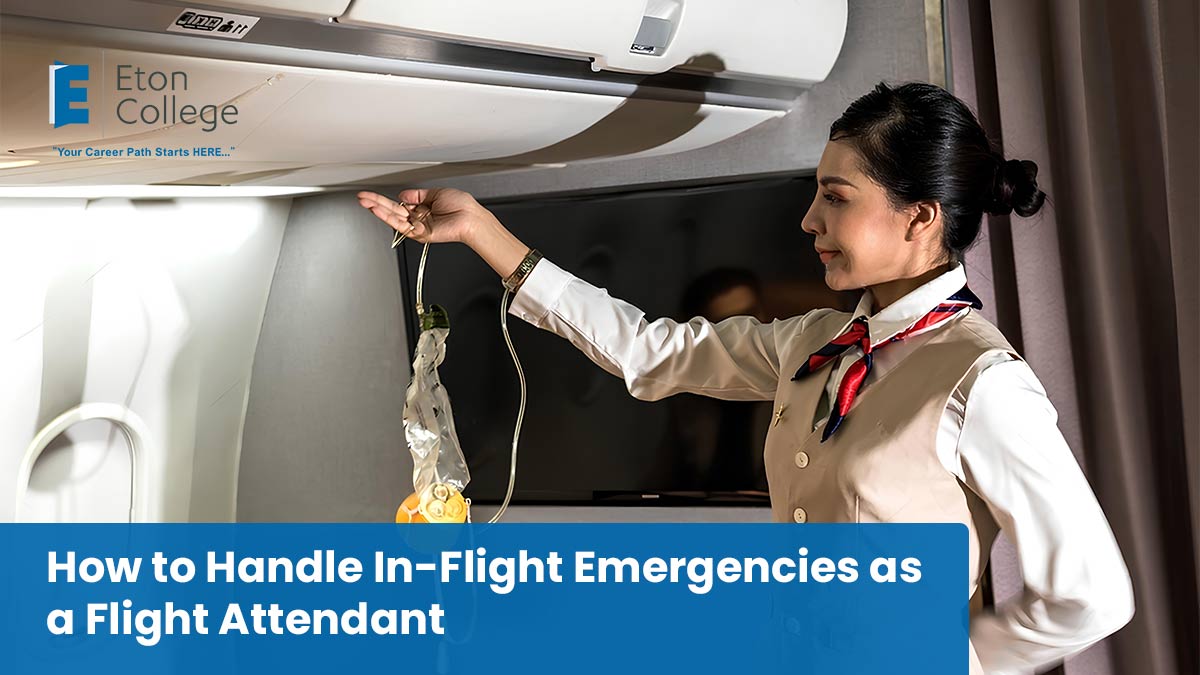- Learn the advantages of becoming a flight attendant, like traveling, flexibility, and benefits.
- Understand the challenges encountered by a cabin crew member, which are irregular working hours, the physical demands it has on the individual, and having to spend some time away from the family.
- Learn how one’s personal growth can be nurtured and experience unique life situations with an airline attendant career.
- Find out how a course to become an airline service representative prepares individuals to succeed in this dynamic field.
- Gain insights into the day-to-day responsibilities and whether this career aligns with your goals.
Becoming an air host/hostess is a dream for many who are drawn to the skies and the idea of a jet-setting lifestyle. However, like any profession, it comes with its fair share of ups and downs. This article explores the pros and cons of becoming a flight attendant, offering a balanced perspective for anyone considering this career.
The Pros of Becoming a Cabin Crew Member
- Travel Opportunities
One of the biggest draws of the profession is the chance to see the world. Airline attendants enjoy the unique privilege of traveling to international destinations, often with free or heavily discounted flights. - Competitive Pay and Perks
While entry-level salaries might vary, experienced air hosts/hostesses can earn a competitive income. Additionally, perks like travel allowances, hotel accommodations, and meal stipends enhance the overall package. - Flexible Scheduling
Most airline service representatives appreciate the variety in their schedules. Unlike traditional 9-to-5 roles, the shifts often include longer breaks between trips, allowing for personal time or side pursuits. - Building Global Connections
Interacting with passengers and colleagues from diverse cultural backgrounds can be incredibly rewarding. It broadens horizons and helps develop strong interpersonal skills. - Career Growth Opportunities
The aviation industry offers numerous opportunities for advancement. Experienced attendants may move into senior roles, training positions, or even management within airline companies.
The Cons of Becoming a Cabin Crew Member
- Irregular Hours
Air hosts/hostesses often work unconventional hours, including nights, weekends, and holidays. Adjusting to such schedules can be challenging, particularly for those with families.
Solution: Airlines provide crew members with scheduled rest periods and extended breaks between rotations to balance the demands of irregular hours.
- Physical Demands
The job requires standing for long periods, lifting heavy luggage, and navigating confined spaces. Over time, this can lead to fatigue or physical strain.
Solution: Airlines often offer ergonomic training and fitness programs to help attendants maintain their health.
- Jet Lag and Fatigue
Frequent changes in time zones can disrupt sleep patterns and lead to jet lag.
Solution: Adopting a routine for managing sleep cycles and staying hydrated during flights can alleviate these challenges.
- Customer Service Challenges
Handling difficult passengers and unexpected situations, such as flight delays, can be stressful.
Solution: Airlines provide extensive customer service training during airline attendant courses, equipping crew members with conflict-resolution techniques.
- Limited Time at Home
Being away for extended periods can be difficult for those who value time with family and friends.
Solution: Many airlines allow crew members to bid for preferred schedules to better balance work and personal life.
How to Navigate the Challenges
Despite the cons, airline attendants often find ways to thrive in their roles. Developing strong organizational skills, practicing self-care, and leveraging airline support systems are key strategies. Enrolling in a cabin crew course is a great way to prepare for these challenges and gain the skills needed to succeed.
Is Becoming a Flight Attendant Right for You?
A career as a flight attendant offers unparalleled opportunities to travel the world, meet people from diverse cultures, and grow personally and professionally. While the job comes with challenges like irregular hours and physical demands, the rewards often outweigh the difficulties.
By enrolling in the best air host/hostess course, you can prepare yourself for the exciting journey ahead. Whether you dream of jet-setting to exotic destinations or contributing to passenger safety and comfort, this career offers a fulfilling and dynamic path.
Take the first step toward the skies—your adventure awaits!
FAQs About Flight Attendant Journey
- Is there an age limit to becoming a cabin crew member?
Most airlines don’t have a maximum age limit, focusing instead on health and job readiness. - Do I need prior experience to become an airline attendant?
No, but customer service experience is often an advantage. Courses for an airline service representative provide essential training for those new to the field. - How long does it take to complete an air host/hostess course?
Typically, these courses last between 8 to 14 weeks, depending on the program. - What qualities make a great cabin crew member?
Adaptability, resilience, excellent communication skills, and a customer-focused mindset are vital. - Are airline attendants allowed to work part-time?
Some airlines offer part-time or seasonal positions, though these opportunities may vary. - How do airlines address crew health and wellness?
Airlines provide wellness programs, access to fitness facilities, and scheduled rest periods to promote health.




